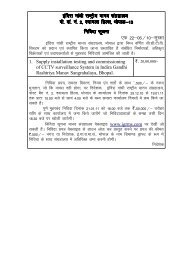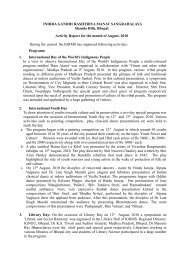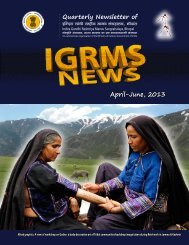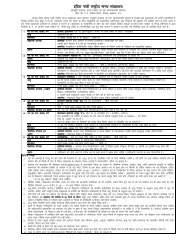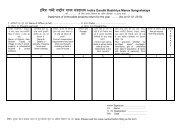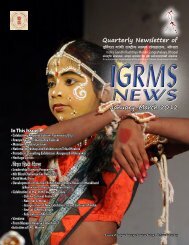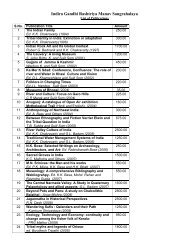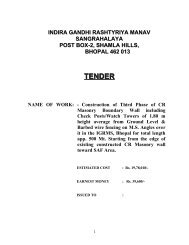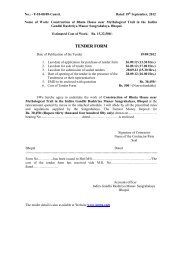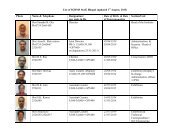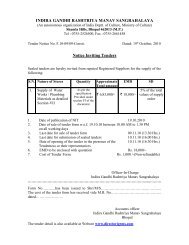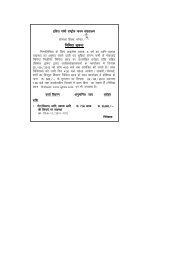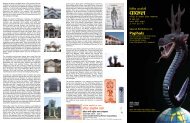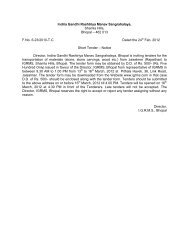Indira Gandhi Rashtriya Manav Sangrahalaya (National ... - IGRMS
Indira Gandhi Rashtriya Manav Sangrahalaya (National ... - IGRMS
Indira Gandhi Rashtriya Manav Sangrahalaya (National ... - IGRMS
You also want an ePaper? Increase the reach of your titles
YUMPU automatically turns print PDFs into web optimized ePapers that Google loves.
<strong>Indira</strong> <strong>Gandhi</strong> <strong>Rashtriya</strong> <strong>Manav</strong> <strong>Sangrahalaya</strong> 289<br />
good collection of varieties of plant-species. Two pockets of the <strong>IGRMS</strong> campus<br />
in Bhopal, have been developed into ethno-botanical gardens with prototypes of<br />
sacred grove shrines, as seen in Bihar, Chhattisgarh (Sarna), Kerala (Kaavu),<br />
Maharashtra (Devrahati), Manipur (Umanglai), Meghalaya (Maw-bukhar), Rajasthan<br />
(Oran), Tamilnadu (Kovil-Kadu).<br />
To promote the traditional practice of health care system and its efficacies and<br />
continued vitality in advanced conditions, national level interactive workshops of<br />
tribal medicine-men and exhibitions of their practices were organized in different<br />
regions, and a directory of such medicinal practitioners was published.<br />
To promote the literary traditions of ‘marginalised’ communities workshops were<br />
organized at Kalimpong and Takna (West Bengal), Arakku Valley (Andhra<br />
Pradesh); Guwahati (Assam) etc. Workshops of Pandits were organized at Himachal<br />
Pradesh for transmission of traditional texts associated with Tantrik system of<br />
prognostication and healing, written in ancient and vanishing script.<br />
Inter-regional cultural exchange programmes of artisan communities and performing<br />
artists were organized, with special focus on the North-eastern communities, to<br />
provide them platforms to interact with the cultures of other parts of the country.<br />
This was necessary to reduce the ethnic tension gripping in different pockets of<br />
North-east India. Purvottari-festival of artisan communities of the eight Northeastern<br />
States is organised in a North-eastern State annually.<br />
To promote traditional arts and crafts of folk and tribal craftsmen Interactive<br />
workshops, meets of different community groups were organized across the<br />
country, (Andhra Pradesh, Madhya Pradesh, Himachal Pradesh, Rajasthan, Gujarat,<br />
Tripura, Tamilnadu, Orissa, Tamilnadu etc.). In collaboration with the Kollam<br />
District Administration and Tourism Department of Kerala, Paramparya festival<br />
of traditional artisans and craftsmen were organized at Kollam, with participation<br />
of over 500 tribal and folk artisans from different parts of India. Later similar<br />
events were organised at Edakkal, in collaboration with the Wayanad District<br />
administration in Kerala.<br />
To document and promote the importance of traditional water management<br />
traditions workshops were organized in Gujarat and Budhelkand area of Madhya<br />
Pradesh.<br />
It also supports at various levels in organizing seminars and symposiums to<br />
motivate the research scholars for exchange of ideas and new thesis. A three tier<br />
networking has been built up with different state/central government<br />
organizations, non-government agencies and individual experts engaged in the<br />
exploration and replenishment of local knowledge and techniques of communities.<br />
Bringing Communities to Museum<br />
A number of collaborative programmes are being organized, to motivate the<br />
different section of communities in appreciating the cultural diversity and national<br />
integration. Some of them are as follows:



